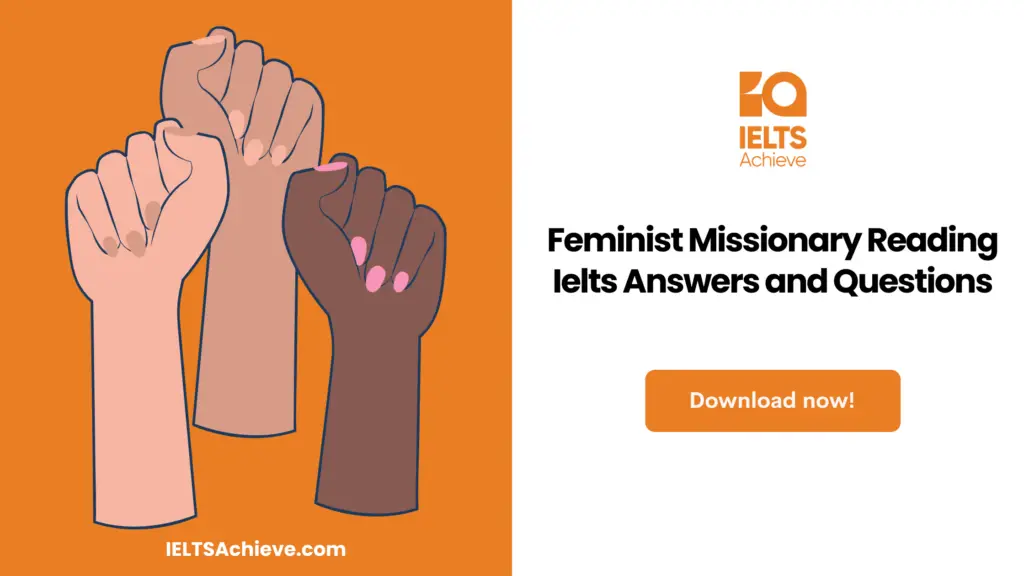The Blog post contains the following IELTS Reading Questions
- IELTS Reading summary completion
- IELTS Reading YES/NO/Not Given
Stay informed and prepared for success – Explore our comprehensive Reading Test Info page to get valuable insights, exam format details, and expert tips for mastering the IELTS Reading section.
IELTS Reading Passage – Feminist Missionary

The Feminist Missionary
Western feminism, exported to India and many other third world countries in recent decades, has brought with it serious problems. It’s not that we don’t know what to do with it, that women’s significance and dignity are alien to us. In fact, we Indians have a much longer history of individual women’s assertiveness than the West, and a well-established tradition of making space for women whose aspirations draw them beyond stereotypical paths. Rather, the problem is that feminism has acted as a tool of cultural imperialism. In its Indian form, it has clouded issues and advocated harmful tactics rather than served as a liberating force. Many ideologies emanating from the West adopt a proselytizing role. Their underlying assumption is that all those who refuse to be converted are steeped in ignorance or stupidity. Western feminists display missionary zeal-they’re eager to save souls and tend to look down upon, be hostile to, or at least pity those not already converted. For instance, most feminists – Western and Indian alike – react with hostility to my refusal to be labelled as such. It took me a long time to understand the reason: Anyone refusing to be counted as a convert seems to be challenging feminism’s own tenet that it has universal applicability, that it’s a superior state of being, and that only feminists stand up for the rights of women. I personally find the term an avoidable burden. It means nothing to most Indians. Neither feminism’s history nor its symbolism evokes any response whatsoever among the majority of Indian women.As products of a more homogenized culture, most Western feminists assume a woman’s aspirations the world over must be quite similar. Yet a person’s idea of a good life and her aspirations are closely related to what is valued in her particular society. This applies to feminism itself. An offshoot of individualism and liberalism, it posits that each individual is responsible primarily to herself. At the same time, most feminists view the state as a vital agency for the protection of their individual rights. This view has served to atomize Western societies, often leaving people with only the authority and support of the state (and not even their family) for protection of their rights when they are violated by others. In societies like India, most of us find it difficult to tune in to this extreme individualism. For instance, most Indian women are unwilling to assert rights in a way that estranges them not just from their family but also from their larger community. They want to ensure their rights are respected and acknowledged by their family and prefer to avoid asserting their rights in a way that isolates them. This isn’t slavery to social opinion. Rather, many of us believe life is a poor thing if our own dear ones don’t honour and celebrate our rights, if our freedom cuts us off from others. In our culture, both men and women are taught to value the interests of our families more than our self-interest. (Most feminists consider this world view a product of low self-esteem.) Cultural issues aside, my most fundamental reservation regarding feminism is that it has strengthened the tendency among India’s Western-educated elites to adopt the statist authoritarian route to social reform. The characteristic feminist response to most social issues affecting women-in the workplace, in the media, in the home-is to demand more and more stringent laws. The results in most cases do not better women’s lives but rather facilitate a whole spate of vicious and harmful legislation which has put even more arbitrary powers in the hands of the police and government-powers that are routinely abused.Most of the feminists’ energies are spent appealing to governments to enforce the social reforms they’ve proposed. But dearly held and deeply cherished cultural norms cannot be changed simply by applying the instruments of state repression through legal punishment. Social reform is too complex and important a matter to be left to the police and courts. The best of laws will tend to fail if social opinion is contrary to them. Therefore, the statist route of using laws as a substitute for creating a new social consensus about women’s rights tends to be counter-productive. The final problem with Third-World feminism is that its aspirations are largely directed Westward. Most feminist organizations in India and in other developing countries are dependent on Western funding agencies, and accountable primarily to them rather than to the society they claim to serve. Their priorities and agendas are prone to change from year to year depending on the availability of funds. The moment the United Nations declares the year of the girl child, everyone gets busy planning seminars, writing, researching and making films on the girl child. If the next year gets declared the year of the media, the girl child is forgotten and the focus shifts to media representation of women. It is the same in the academic world. From structuralism to deconstructionism to post-modernism, the compass needle keeps swinging, depending on what brings in easy grants, jobs and recognition. This occurs even as it leads feminists towards such an esoteric vocabulary that regular women don’t comprehend a word of it. It also leads feminists toward irrelevance.
Feminist Missionary Reading Questions
Questions 1-5
Do the following statements reflect the claims of the writer in the reading passage?
YES if the statement agrees with the writer
NO if the statement contradicts the writer
NOT GIVEN if it is impossible to say what the writer thinks about this
1. Madhu Kishwar prefers not to call herself a feminist.
2. Effective laws made and implemented by women would lead to a great improvement in Indian women′s lives.
3. Improvements to women′s lives can best be effected through traditional channels.
4. The UN should stop changing the focus of its ‘years′.
5. Indian women never dare to insist on their rights because of their low self-esteem.
Want to excel in identifying the writer’s views and claims? Click here to explore our in-depth guide on how to accurately determine Yes, No, or Not Given in the IELTS Reading section.
Questions 6-13
Complete the summary of the reading passage below. Choose your answers from the box below. NB: There are more words/phrases than you will need to fill the gaps. You may use a word or phrase more than once if you wish. Madhu Kishwar describes three main problems associated with the introduction of Western feminism to Third World countries such as India. The first is that it becomes a form of 6__________, assuming that ideals of individualism and liberalism form the 7__________ grounding for women′s aspirations. Secondly, she claims that Western feminism encourages dependence on the state for the 8______________ of individual rights. She sees a dependence on legal channels as likely to give 9____________ powers to the police and to government officials. The third problem is that because feminist organizations in developing countries depend on Western 10____________, their focus moves to match the aims of these funding agencies, 11____________ on the needs and aspirations of women in their own 12__________. She suggests placing greater reliance on a 13___________ which is firmly grounded in the culture of the community concerned
Unlock your full potential in the IELTS Reading section – Visit our IELTS Reading Practice Question Answer page now!
Recommended Questions:
Renewable Energy IELTS Reading Question with Answer
Feminist Missionary Reading Answers
1. Answer: True
2. Answer: False
3. Answer: Not given
4. Answer: Not given
5. Answer: False
6. Answer: Cultural imperialism
7. Answer: universal
8. Answer: protection
9. Answer: excessive
10. Answer: funding agency
13. Answer: society
14. Answer: social consensus

We hope you found this post useful in helping you to study for the IELTS Test. If you have any questions please let us know in the comments below or on the Facebook page.
The best way to keep up to date with posts like this is to like us on Facebook, then follow us on Instagram and Pinterest. If you need help preparing for the IELTS Test, join the IELTS Achieve Academy and see how we can assist you to achieve your desired band score. We offer an essay correction service, mock exams and online courses.

